Ukraine's Ambassador Andrii Melnyk: 'Situation in the world is the most difficult since 1945'
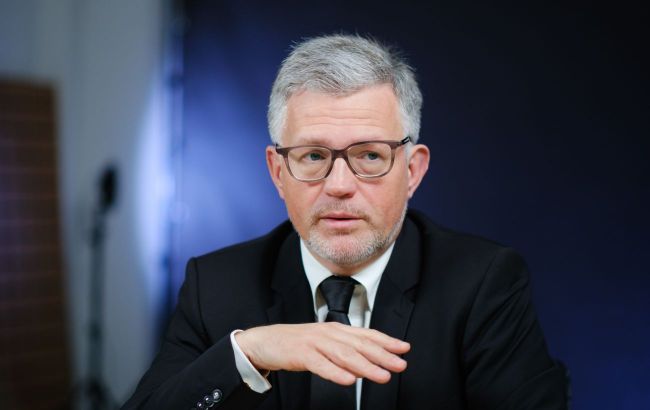 Andrii Melnyk, Ukraine's Ambassador to Brazil (photo: Vitalii Nosach / RBC-Ukraine)
Andrii Melnyk, Ukraine's Ambassador to Brazil (photo: Vitalii Nosach / RBC-Ukraine)
Ukraine's Ambassador to Brazil, Andrii Melnyk, talks about Russian influence in Brazil, the new German government, Donald Trump, negotiations with the United States, and his future work at the UN in an interview with RBC-Ukraine.
Takeaways
- Why does Ukrainian diplomacy need to take off its rose-colored glasses?
- Why has Brazil become so close to Russia in recent years?
- What will be the first test for the new German Chancellor, Merz?
- Why is Ukraine doomed to find an approach to Trump?
Andrii Melnyk is probably the best-known Ukrainian diplomat to the general public. His long tenure as ambassador to Germany, which took place during the first months of the full-scale Russian invasion, contributed to this. The German authorities demonstrated miraculous indecision at that time and constantly tried to prevent further escalation.
Melnyk, in turn, publicly acted in ways that were extremely atypical for a diplomat, and his public criticism of the German authorities was often on the verge of, or even beyond, a foul. However, thanks to such non-standard methods, the Germans were stirred up a bit in 2022.
From November 2022 to mid-2023, Melnyk worked as deputy foreign minister, and then went on a business trip this time to Brazil. This country with a huge GDP and population is rightfully considered one of the leaders of the Global South, with growing geopolitical ambitions.
What is important - and unfortunate - for Ukraine is that in recent years, Brazil has been drifting quite rapidly toward Russia. And in a conversation with RBC-Ukraine, Ambassador Melnyk explains why in great detail. He also suggests countermeasures, which, however, will require Ukraine to allocate more resources (although still much less than Russia).
However, another diplomat will soon have to continue to counteract the Russians. In a few weeks, Melnyk will move to New York, where he will become Ukraine's representative to the UN, an organization that is not viewed favorably by Ukrainians.
— For you personally, was this cadence as ambassador to Brazil more of an honorable exile or a challenge?
— For me, Brazil was a real challenge, a kind of diplomatic shake-up, and not only because it was the first assignment outside my native European continent, which I have been doing all my career.
To be honest, when the decision was made to send me to Brazil, I did not jump for joy, as I was very skeptical. Moreover, I tried my best to convince them that it would hardly be the best use of my abilities and experience for the benefit of the state during this critical period of the war.
— Why?
— For various reasons, but believe me, it was not because I was afraid or afraid of any challenges in my life. The fact is that as Deputy Foreign Minister at the time, I was actually in charge of Latin America. So I knew perfectly well that we could not have any breakthrough with Brazil soon. Instead, false expectations were created in society that Melnyk would be sent across the ocean, and Lula (Brazilian President - ed.) would immediately give Ukraine weapons.
From the very beginning, I realized that it would be naive to hope for this, at least. Unfortunately, there is a huge gap between these artificially inflated expectations and the brutal reality that exists here in Brazil on the ground, and over the past two years, unfortunately for Ukraine, this gap has widened even more.
What has been achieved in these conditions? Quite a bit has been achieved, and this is despite the unfriendly political environment for Ukraine. However, before I mention some of the achievements, I would like to say that during this time, I was able to feel the Brazilian matrix from the inside, to understand the limits of what is possible and impossible for Ukraine. The sad conclusion is that we have missed and lost so much here in the last twenty years that it will be almost impossible to make up for this gap in political mentality. It will require the courage to take radical measures.
This Brazilian train has run so fast in the opposite direction from Ukraine, towards the new matrix of the Global South, but what is especially painful, there has been a radical tilt towards Russia at the same time.
In my opinion, we should always be realistic and set ourselves realistic goals. Today, the truth is that Brazil's political beau monde, and I mean not only the current leftist government, but the entire political elite in general, does not see any benefit in developing relations with Ukraine. We are not among their priorities, neither in terms of geopolitics, nor in terms of economy and trade.
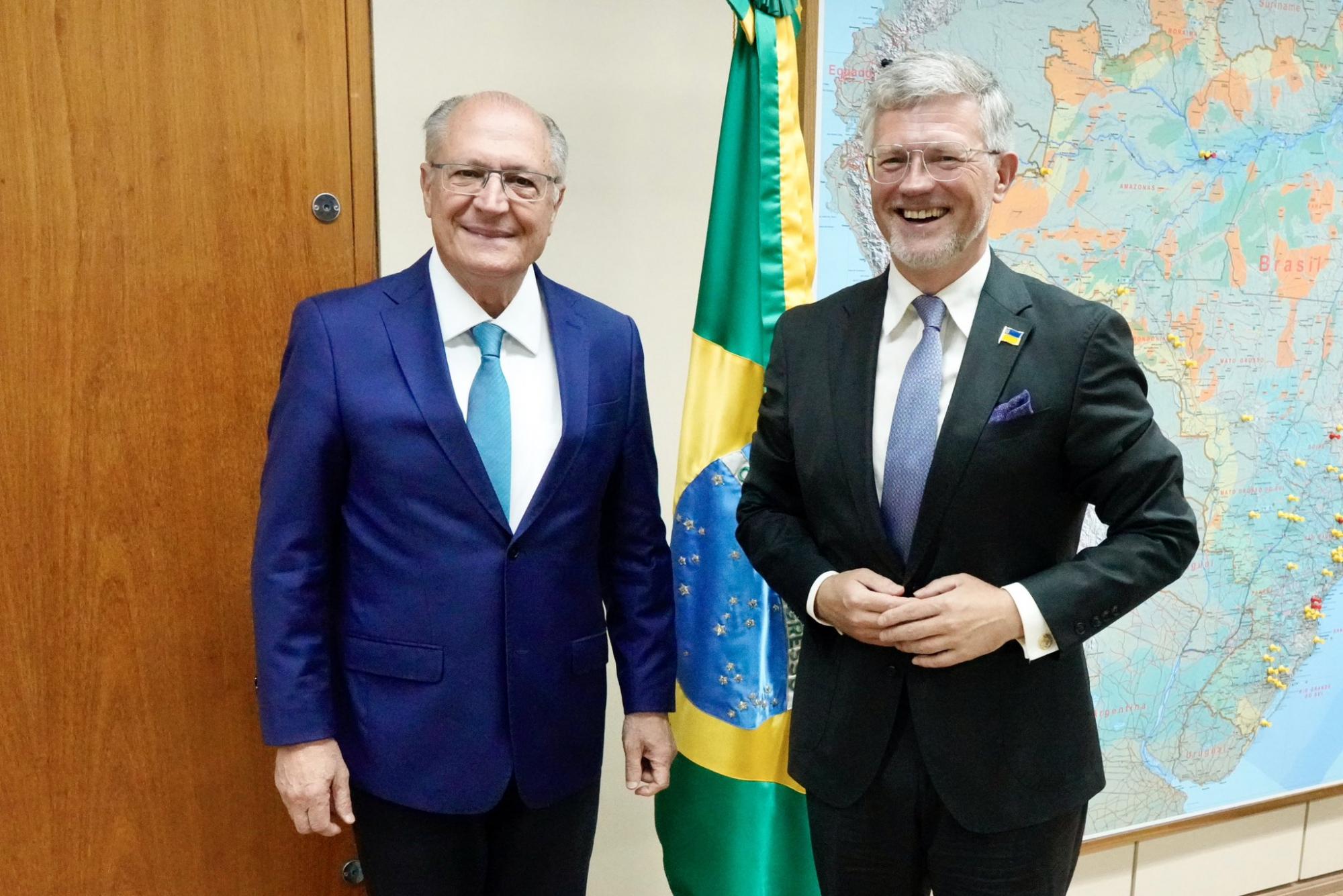 Andrii Melnyk and Brazilian Vice President Geraldo Alckmin (photo: x.com/MelnykAndrij)
Andrii Melnyk and Brazilian Vice President Geraldo Alckmin (photo: x.com/MelnykAndrij)
This statement is quite bitter for us, but unfortunately, it is an obvious fact. Although government officials occasionally say that Brazil views Ukraine as a strategic partner (indeed, this was agreed on paper back in 2009), the real course has long been untrue. In words, the Brazilians will tell you that they are for world peace, for dialogue, for partnership, for equidistance from the parties to armed conflicts, in short, for everything good and against everything bad. All this talk is very nice to listen to, but it just makes you very sad.
Because all this rhetoric has been and remains, and de facto there is a drift towards Russia, I would even say a smooth rollback from the Western world, really by leaps and bounds. This new reality simply needs to be realized to act correctly and effectively and to advance our interests. It is high time for Ukrainian diplomacy to put aside its rose-colored glasses.
— So what did you manage to achieve in such circumstances?
— I have only been in this country for a year and a half. I arrived in early September 2023, and two weeks later, we managed to organize the first meeting between Presidents Zelenskyy and Lula in New York on the sidelines of the UNGA session. Believe me, we had to use many, to put it mildly, non-standard methods, because Brazil had no particular desire to do so. And although the conversation itself was called frank and constructive by both heads of state, it unfortunately became the first and last one so far. The real breakthrough that many expected never materialized.
— Why is this so?
— There are objective reasons for this, because at the end of 2023 and beginning of 2024, Brazil made a behind-the-scenes strategic decision, which, of course, no one has announced and will never announce, that it is better not to risk a revival in the Ukrainian direction, but to deepen the dialogue with Moscow on a large scale.
All of this geopolitical shift has taken place against the backdrop of a dramatic shift in emphasis not just toward the Global South or the BRICS. It is a Brazilian train that has begun to move full steam ahead towards the two most important actors: China and Russia. And over the past year, it was the ties with Moscow that began to gain momentum. Lula had four cordial phone conversations with Putin.
However, all our efforts to continue the Zelenskyy-Lula dialogue have been in vain. Even the agreement reached on the visit of the Ukrainian Foreign Minister to Brazil was quietly torpedoed by the Brazilian side. Instead, the red carpet was rolled out for Lavrov, and Lula welcomed the Kremlin propagandist with open arms at his official residence, Alvorada.
Against this not particularly friendly backdrop, we still managed to achieve some progress, even in the political dimension, although - and I felt this in my daily work - an unspoken stop signal was given throughout the government system.
First of all, I am happy that we were able to establish communication at the level of Vice President Geraldo Alckmin for the first time in the history of bilateral relations. This is one of the most powerful figures. Rumor has it that it was largely thanks to him that Lula managed to win the last election. After much preparatory work, an online meeting was organized between the Brazilian Vice President and First Vice Prime Minister of Ukraine, Yulia Svyrydenko.
In the same format, the deputy prime minister spoke with one of the most influential and close to Lula, his fellow party member, Minister of Labor Luiz Marinho. The online meeting between the two defense ministers, Rustem Umerov and José Múcio, was also important, for the first time in history.
Despite the existing rules of protocol, I managed to meet with almost a third of the members of the Brazilian government, including key ministers from the ruling Workers' Party: Wellington Diaz of Social Policy, Paulo Teixeira of Agricultural Development, Luiz Marinho of Labor, and many others. However, and I am convinced of this now, all the agreements reached were put on hold by a team from the highest offices to prevent anything serious from happening with Ukraine.
The reason for this inhibition, in my opinion, is more than banal: it was deemed appropriate not to take unnecessary steps in order not to irritate Russia, God forbid. It was from the beginning of Russia's full-scale invasion of Ukraine that the formal strategic partnership between Brazil and Moscow became more of a strategic partnership in essence.
— How does it manifest itself?
— The main thing is the economic track. It is in the last three-plus years of the war that Russia has become not just one of Brazil's main trading partners, becoming the top five largest importers. In the interim, Moscow has become one of the largest suppliers of goods that are truly critical to Brazil's economy: first and foremost, diesel and mineral fertilizers.
Let me give you a few illustrative examples. As of today, Russia has become a de facto monopolist in diesel imports. Its share in the Brazilian market is 65% of all diesel imports. Just think about it - 65% is two-thirds! Before the large-scale invasion of Ukraine, this share was less than 1% in 2021. Thanks to dumping prices due to Western sanctions, the Russians were able to displace the Americans, who had previously held the lion's share (now only 15%). Brazil paid Russia almost $10 billion for 6.5 million tons of diesel. In other words, for comparison, it is about one-tenth of the total defense budget of Russia. With this money, the Kremlin can finance its military campaign against Ukraine for more than a month. This is our vision of diesel supplies.
And as for Brazil itself, diesel is one of the main factors in curbing inflation. What is inflation control? This is one of Lula's biggest challenges ahead of the presidential and parliamentary elections that will take place next fall. And the recent sharp rise in prices for basic products threatens the support of Lula's core constituency, the poorest segments of the population. That's diesel diplomacy for you.
A similar situation is observed about wheat imports - it was during Russia's full-scale invasion of Ukraine that the volume of supplies from Russia to Brazil increased thirtyfold: from 28,000 tons in 2021 to 900,000 tons in 2023! Today, Russians are the second largest supplier after Argentina and occupy more than 20% of the Brazilian market. And all thanks to significant discounts of about $60 per ton, which Russia has offered to its Brazilian allies since 2022.
Not to mention the fact that Russia has been and remains a key player in the import of mineral fertilizers, which affect the yields and profits of the agro-industrial complex (its market share ranges between 20 and 25%, with a value of about $4 billion a year). I don't remember a single meeting with Brazilian politicians who didn't mention the importance of Russian fertilizers.
This is what we have. It is not surprising that in the context of Brazil's growing economic dependence on Russia, any Ukrainian initiatives have been blocked and, I am afraid, will continue to be blocked for one simple reason: there is a general line not to make unnecessary moves, because any progress in relations with Kyiv could jeopardize this truly strategic track with Russia.
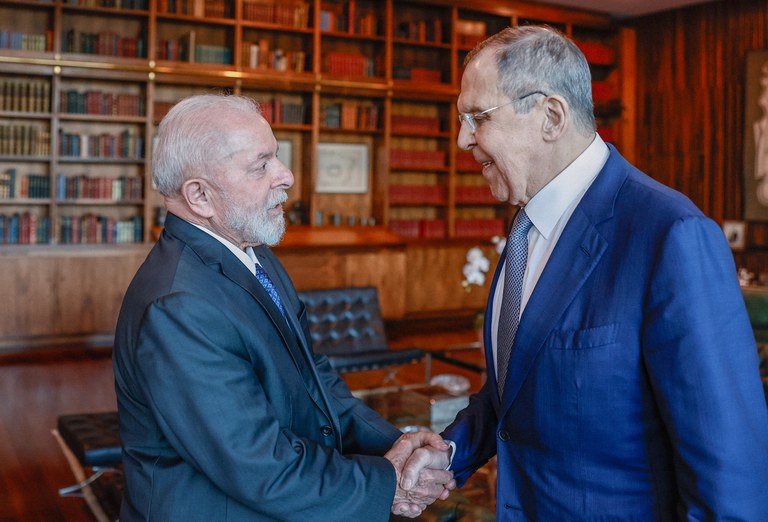
Brazilian President Lula da Silva and Russian Foreign Minister Sergei Lavrov (photo: iabrics.org)
Forgive me for all these details. I think it would be important for our readers to understand the behind-the-scenes of the Brazilian file better. So we had to look for, so to speak, workarounds to promote Ukraine's interests.
The main track on which we managed to make significant progress was working with the National Congress. Brazil, despite all the nuances, has been and remains a democratic country for more than 200 years of independence, with a traditionally high influence of parliamentarism and powerful independent media. The main task was to expand the circle of sympathizers and friends among congressmen, both in the government coalition camp and among opposition circles. As a result, for the first time in a decade and a half, we organized two visits of Brazilian parliamentarians to Kyiv. As a result, they not only talked to the President and members of the Verkhovna Rada, but most importantly, they saw the consequences of the Russian war with their own eyes and conveyed their impressions to the public.
Many important decisions were also made in the parliamentary track, including a resolution of solidarity with the Ukrainian people, calling on the Lula government to change its approach to Ukraine on the third anniversary of Russia's full-scale invasion.
The second, no less important block of work is the media. Two years ago, there was no bias on the part of the leading media towards Ukraine at all. Of course, they wrote about Ukraine, but mostly in terms of news.
Unfortunately, there are still no Brazilian journalists who are permanently accredited in Ukraine, but we have created a wide pool here that already includes several dozen influential journalists. We have organized a number of their visits to Ukraine, not only to Kyiv but also to the East, and we have prepared all the meetings and exclusive interviews with the Ukrainian President for them. There is not a day that goes by when I do not communicate with the local media in one format or another. And this is also beginning to bear fruit because there is a circle of people for whom Ukraine is no longer an abstract concept. We have established a close emotional connection between the Brazilian media and Ukrainians and their struggle.
The third block, which has concrete achievements even after a year and a half, is work at the state level because Brazil is a federal state, like Germany. I managed to travel to more than half of the states, meet personally with governors, speak in many parliaments, and visit a large number of influential mayors - perhaps for the first time in history. Among the examples is the municipal partnership between Odesa and Fortaleza, the capital of Ceará, the fourth largest city in the state. These regional trips allowed us to open a parallel track of engaging political elites in favor of Ukraine. It so happened that the work of the diplomatic mission used to be focused on the capital, Rio de Janeiro, São Paulo, and the state of Paraná, where our Ukrainian community is located. We have changed this matrix.
— By the way, many ethnic Ukrainians are living in Brazil, does this diaspora play a role in promoting our interests?
— This is perhaps the most painful topic for me. Our community includes more than a million Brazilians of Ukrainian descent. A million! And although Brazil itself has a population of over 200 million, this million of our compatriots living compactly in one state, Paraná, is a truly powerful force.
In general, this wonderful Ukrainian community has lived and continues to live its life for over 130 years. This is the fifth generation of migrants, sometimes even the sixth, and they feel comfortable here. People from Ukraine feel happy here, and many of them have achieved a high status in society. These are wonderful people who have preserved Ukrainian identity, culture, customs, and our religion. In Paraná alone, Ukrainians have built more than 240 churches. But, unfortunately, the political influence of our unique community in Brazil is almost zero. This makes me very bitter.
Moreover, this influence is almost absent both at the federal level and at the level of the state of Paraná, which has become a new homeland for Ukrainians. In the state parliament, where I had the honor of speaking recently, there is only one deputy with Ukrainian roots, Marcia Husuliak. Therefore, in cooperation with the Central Representation of Ukrainians in Brazil, we have begun to take steps to radically change this deplorable situation so that the voice of our community, of these Brazilian citizens as voters with their preferences, cannot be ignored.
And the last challenge is language. Although Ukrainians in Brazil have preserved their identity, almost no one speaks Ukrainian, especially among young people. Therefore, we have also started a serious effort to ensure that Ukrainian language lessons are included in the public school system in the state of Paraná, in those cities where our compatriots still live compactly, so that children can learn Ukrainian as a foreign language.
This requires that the Ministry of Education of Ukraine finally start sending teachers on long-term business trips, as our neighbors Germany and Poland have been doing successfully. Unfortunately, all of our proposals to create such a network have so far gone unanswered by Kyiv.
— Sometime in the second year of Russia's full-scale invasion, the Ukrainian government declared a course toward the Global South, and there was a great deal of activity in this direction. But given Ukraine's limited resources, how much sense does it make to disperse them and try to reach everyone? Perhaps it is better to concentrate on the countries where decisions are made: The United States, France-Germany-UK, perhaps China, but not Africa or Latin America?
— You are right. Of course, the country has been at war for four years now, and everyone understands that all available resources should be directed primarily to defense, to the army. This is obvious. It is also clear that the main foreign policy priorities should be focused on those countries that are our key allies.
But I have always advocated and will continue to advocate the idea, at all our internal meetings within the diplomatic system, that, especially against the background of these huge expenditures on our army, we need to increase in parallel the funding of the Ministry of Foreign Affairs and the entire embassy system dramatically, tenfold.
Does it sound too ambitious? But it is only at first glance. Let me give you some figures: the share of the Ministry of Foreign Affairs in the total budget of Ukraine is currently about 0.19%. In Germany, this figure is 8 times higher (1.46%). I hope that the top leadership of the state will be able to make a historic decision to gradually increase spending on domestic diplomacy to at least one percent.
One new small embassy that we could open in Latin America, for example, would cost 200-300, let alone 400 thousand dollars for the whole year! That is much less than one (!) missile for the German IRIS-T air defense system, which we managed to break through during my ambassadorial cadence in Berlin back in 2022. Of course, this comparison is very conditional.
But still, for this amount of money, Ukraine can finally be diplomatically represented in one of the countries where we have never had a presence during all the years of independence. I'm talking about an ambassador, plus one diplomat, one technical officer, so it's a minimum 1+2 or 1+3 format. Our embassy in Brazil, by the way, is not much bigger.
It would be naive to hope for quick results from such an expansion of the geography of our diplomatic missions. But we can all see how complicated the situation is among the countries of the Global South in their relations with Ukraine. It is finally time to start this process. This world is moving so fast in a direction that we do not like, and if we do not change our approaches right now, it will be too late tomorrow.
That is why I am convinced that our basic priorities must remain, and you have mentioned them, and it is clear that we need to invest even more human resources in relations with major players, just as tenfold. But at the same time, we cannot forget about this when we vote at the UN General Assembly, where the voice of each country, whether it is the G7 or an island nation in the Caribbean, has equal weight.
Therefore, I am convinced that we must expand the network of embassies in parallel. Believe me, this is an investment that will pay off a hundredfold, not today, but this diplomatic profitability will be tangible, maybe in 5 years, maybe in 10 years, and maybe in a year. This is not the kind of money that you need to save on, because it will all come back to bite you, and not just at the UN.
— You mentioned at the very beginning several reasons why Russia has such a strong position in countries like Brazil. Multibillion-dollar contracts for diesel, grain, whatever. Obviously, in many countries of the Global South, there are also some long-standing ties with Moscow, even from the Soviet era. There are narratives of anti-Americanism that bring the South closer to Russia. There is probably also a powerful factor of direct corruption of elites by Russians, not only political but also influencers and public figures. What can Ukraine do to counteract all this, except for our absolute moral rightness as a victim of unprovoked aggression, even with better funding for diplomacy than we have now?
— Look, as of now, we have embassies in Latin America in Brazil and Argentina, which have been there since the first years of independence, followed by an embassy in Peru, and only recently in Chile. That is, we have only 4 diplomatic missions on the entire Latin American continent so far.
We have two embassies in Central America, in Mexico and Cuba. That is, for more than 30 countries in Latin America and the Caribbean, we have as many as six diplomatic missions. And all of them are small: I have three diplomats working with me in Brazil, and last year I had only one diplomat for a long time. Is this normal?
How can we expect significant changes if in many countries in our region, Ukrainian diplomats or our delegations have been seen several times in three decades, not to mention the last years of Russia's full-scale invasion? At best, a few MPs or a deputy foreign minister will come for consultations, which is all very important and necessary, and they will talk about something and leave. This is not how it works, you know? Because if there is no one in place to implement the agreements reached, then everything goes down the drain.
I am convinced that most countries in the world should have Ukrainian embassies. If we don't do this, we can't hope for a miracle. This is the first story.
The second story is that Russia's influence in Latin America is supposedly so unshakable that it cannot be moved. This is just a myth.
At least here in Brazil, we have never had any super friendly relations with Russia. Even if you compare it to Germany, which I can tell you a lot about, it's absolutely different, because the historical and cultural influence of the Russians there is still enormous, and that's a risk for us. As for Brazil, Russia was indeed one of the first countries to recognize Brazil's independence in 1828. But nobody cares about that. Historically, there have been no close cultural or even economic relations between the two countries.
Just the other day, I had a meeting with the Vice President of Brazil, who received me on the eve of the end of my diplomatic mission and told me himself: Mr. Ambassador, a survey of public opinion in Brazil was recently conducted, and 70% of Brazilians support Ukraine. Of course, I knew about this, as well as about another result of this poll that only 7% support Russia.
The current influence of Russia, which I partially described, has only emerged since the full-scale invasion of Ukraine. Before that, and I am told this directly by Brazilians, no one here knew or heard of Russians in particular, and no one wanted to know. Trade after the collapse of the USSR grew gradually, but it never really affected Brazil's overall balance sheet, and Moscow was never among the top 10 or 15 partners.
When Russia found itself isolated at the beginning of the great aggression in 2022, the lion's share of resources was directed to Latin America and Brazil, as the largest country in the region. And I won't say that from scratch, but from a very low start, the Kremlin has reached the level of strategic relations that I told you about at the beginning of our conversation, and which is now harming Ukraine.
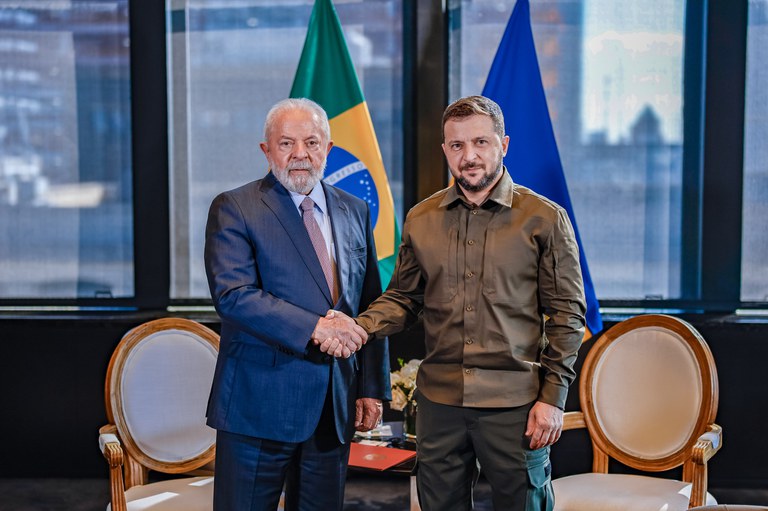
Presidents of Brazil and Ukraine, Lula da Silva and Volodymyr Zelenskyy (photo: gov.br)
What does this mean? It means that if Kyiv starts acting similarly, i.e. investing in human and diplomatic resources, a real economic presence, in the popularization of national culture, in our media voice (from morning to evening in Brazil, the Portuguese-language Russia Today and Sputnik litter the airwaves), we will be able to compete on equal terms with the Russian garbage.
There is no dominance of Russian narratives that the political elite and society would blindly accept. This can and should be changed.
Unfortunately, the domestic system lacks a real, live link between diplomacy and Ukrainian business. Unfortunately, all attempts to create an effective mechanism through which our embassies could successfully help businesses have failed. Everyone lives on their own. Our companies mostly make their way to new markets on their own, and they rarely manage to achieve real synergy. It is very frustrating.
Here's an example: last year, we managed to increase trade between Ukraine and Brazil by 30%. This is supposedly positive news, but when I tell you that it reached $300 million, it's just ridiculous, and not only against the background of Brazil-Russia trade ($12.5 billion). After all, 17 years ago, trade between Ukraine and Brazil amounted to 1.1 billion, or almost four times more than today. So there is nothing to be particularly happy about.
If you read the Brazilian Foreign Ministry's website, it publishes press statements every day. I think that more than half of these statements are not about foreign policy, but about opening new markets. For example, just the latest news from the website that thanks to the efforts of their ministry, together with the Ministry of Agriculture, they managed to open the Turkish market for cattle exports, or the Indian market for citrus fruits. That is, this is a priority for Lula personally, and not just for the Foreign Ministry. The state system is working to open new markets for Brazilian exports every day. This deserves to be recognized. We do not have all this. It is time to change approaches.
— Let's move on to European affairs, namely German affairs. Your German past does not let you go. You have a bunch of tweets in German on your X page, and you regularly give interviews to various German agencies. So do you have a feeling that with the change of power in Germany, things will start moving quickly and in the right direction for Germany, for the whole of Europe, and most importantly, for Ukraine?
— Indeed, I have my finger on the pulse, and my expert opinion is still valued and sought after in Germany, which I cannot say about Ukraine. In my personal opinion, Germany has every chance to become Ukraine's number one partner. Right now is a historic moment when Germany can become a true leader in Europe, not only as an economic power. The future Chancellor Friedrich Merz, whom we know well, has such a geopolitical ambition.
And right now, I think the German interest could be to take advantage of the situation around the peace talks to take the niche of Kyiv's most important ally.
Before that, the Germans were proud to be the second-largest supplier of weapons after the United States. I am proud to have been at the origins of this historic process. It was back in 2022 that opposition leader Friedrich Merz helped Ukraine put pressure on then-Chancellor Olaf Scholz to cross the red lines and provide heavy weapons. I am still grateful to Merz for his support, and I wholeheartedly wish the new German leader every success in his plans.
Knowing him personally as an extremely ambitious person who thinks in historical terms, I believe that he can go down in history as one of the most successful chancellors, especially now, when the situation in Europe and the world is the most difficult since 1945. And also as a true European leader who will be able to save Ukraine by dramatically increasing the volume of military assistance at this critical moment.
At the same time, to be honest, I do not have any final confidence that Friedrich Merz will choose this path of radical support for Kyiv.
— Why?
— There are many objective factors. One of the main ones is the fact that the future government in Germany will be a coalition. The partner of Chancellor Merz and the Christian Democrats will be the Social Democratic Party (SPD) of former Prime Minister Scholz. Most of the SPD's key players, who were in power until recently, will likely remain in government and retain their influence in the new arrangement. Unfortunately, although the issue of military assistance to Ukraine is reflected in the coalition agreement, the relevant wording does not contain any specifics: to what extent, in what timeframe. This was not done by chance, given the existing significant differences between the two coalition members. They deliberately left themselves a wide field for maneuver.
And the first litmus test for the new coalition will be the supply of Taurus long-range cruise missiles to Ukraine. Ironically, it was I who first made this appeal to the German government exactly 2 years ago. Since then, heated discussions have continued. As of now, although the Social Democrats have not directly opposed the Taurus, they have found dozens of arguments not to provide us with this powerful weapon out of fear of escalation towards Russia. So, it is the Social Democrats who are sabotaging this decision.
Recent polls show that two-thirds of German voters are against Ukraine receiving the Tauruses. Why are they against it? Because it was the previous government and ex-Chancellor Scholz personally who did everything possible to intimidate the public, saying that this would be perceived by the Kremlin as Germany's de facto entry into the war on the side of Ukraine.
Instead, Friedrich Merz, during the election campaign and after his victory, directly advocated providing Ukraine with the Taurus system. It was one of his election promises.
Of course, now he can hide behind both the SPD's position and public opinion by refusing to provide Ukraine with it. If this happens, we can forget about all hopes that Merz is capable of becoming the leader of Europe and the entire free Western world. It will be a real failure.
— Given what we have heard and seen from Donald Trump and his team over the past 100+ days, does the free Western world still exist in the sense that we have become accustomed to it over the past decades? And do you see Europe waking up as so many people have said after J.D. Vance's famous speech at the Munich conference?
— Absolutely. I believe that the free Western world remains, despite all the challenges we see in the United States. And these challenges are perhaps the greatest in recent history, not only with Ukraine in the situation of Russian aggression but also concerning our European friends. I believe that this world will survive.
Sometimes I think that many people in Germany are firmly convinced that if Putin decides to go ahead and attack other European countries, Berlin will be able to negotiate with the Russians to keep them from being moved. This, in my opinion, explains the slow pace in strengthening its defense capabilities, and the hope that they will sort things out.
 Taurus missile (photo: Getty Images)
Taurus missile (photo: Getty Images)
But this is a big mistake, because if we look at Putin himself and his entire logic of action, for him, East Germany, where he worked as a KGB agent and where he saw the collapse of the USSR, was and still is mentally part of the lost Soviet empire. And so it would be naive to hope that Putin would abandon his goal of fully restoring this empire if he gets his appetite and throws a new rearmed army of millions at Europe. If I were the Germans, I would not be so relaxed.
I believe that Friedrich Merz feels the reality of this military threat to Germany and will act accordingly. This government will start from a very low base. After all, even now, his party has lost its first place as the most popular force. The level of support for the CDU has dropped to 24%, and the far-right Alternative for Germany party has gained 26% and has taken the lead for the first time in its history. And this trend, I'm afraid, will continue. Therefore, it will depend on the success of Merz and his government to stop the rise to power of right-wing radical forces.
First and foremost, it is about overcoming the recession, but it also depends on whether Merz can restore a sense of security in society against the Russian threat. These successes will determine whether the far right will win the next election.
I still hope that Merz will be able to find a common language with the Social Democrats and convince them to give him a real carte blanche to save Germany and Ukraine.
— In one of your previous interviews, you said that this period between the American elections and Trump's inauguration is super important for Ukraine, that Ukraine should do everything possible to find an approach to him. To what extent has it succeeded? And what approaches should we be looking for now? Where are his pain points or, on the contrary, his comfort zones through which he can and should be approached?
— It is difficult for me to give any recipes, recommendations, or predictions here. Why? Because if, for example, I feel Germany not only with my mind but also with my heart and intuition, and I have already started to feel Brazil better, I lack expertise in the American track. I was briefly involved in this area when I was Deputy Foreign Minister in 2023. But the situation in the White House was completely different then.
I would not want to cross the path of my diplomatic colleagues here or give them advice. We have a new president in the White House, and we understand that the United States has been, is, and will remain for many, many years the largest geopolitical and economic power in the world. And so we have no other choice but to continue to pick up this key, to look for opportunities to reach a completely different level of understanding, communication, and argumentation.
We are simply doomed now, our diplomacy, of course, our top leadership, to find this approach. We cannot afford to give up and say: Well, we tried, we tried, and it doesn't work, or it doesn't work the way we wanted it to. Finita. And I have a feeling, even though I'm not involved in this whole difficult negotiation process, that everything will work out for Ukraine.
— I can't help but ask you, as an experienced diplomat, about that story in the Oval Office. What was it? Was it a provocation, was it a trap, was it just emotions that got out of control for all the participants, or something else?
— For me, it's not so much what happened that matters as what conclusions were drawn. And I think the conclusions were correct.
At that time, I, like all Ukrainians, was, of course, shocked when we saw all this footage, and the first reaction was, of course, how could this be, what a setup there was. My German friends and I were on the phone that day expressing outrage, sympathy, and hope.
My first reaction was, and I even said this publicly, that Ukrainians need to calm down, exhale, and continue to look for an approach to Trump. We just have to smooth the waves.
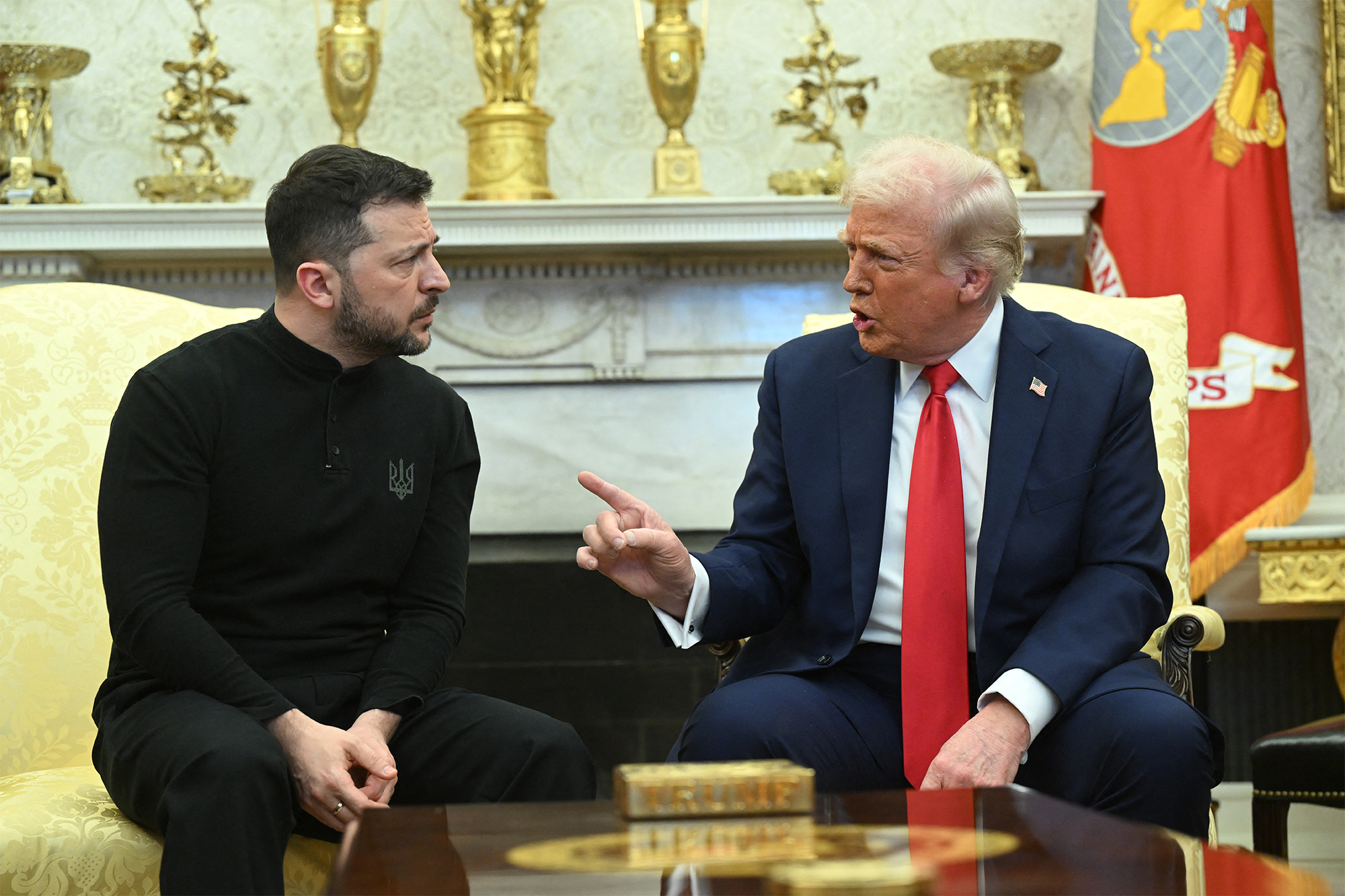 Volodymyr Zelenskyy and Donald Trump in the Oval Office (photo: Getty Images)
Volodymyr Zelenskyy and Donald Trump in the Oval Office (photo: Getty Images)
I sincerely believe that the close alliance between the US and Ukraine will continue and will even be strengthened. For us, it is simply the alpha and omega of our survival. By the way, Europeans sometimes perceived our partnership with the Americans with envy, even as a matter of human nature: why do we trust them more? It's natural, everyone wants to be a best friend: we are the closest to you, and you can't trust them with everything, but we are Europeans, neighbors, and we share the same destiny.
— Do you think the United States is ready to withdraw from the peace process, as they say, or is it a bluff?
— It's hard to say, because politics has become so unpredictable now, there are so many unknowns in this equation. The Germans have a concept called Zweckoptimismus, which means optimism that you force yourself to have. Even if you realize that the situation seems hopeless, you force yourself to believe in a positive outcome. In other words, I still hope, based on this German formula, that this is a tactic of the negotiation process.
And we see that it works, to be honest. All players are involuntarily starting to move faster. We hear statements almost every week from the head of the State Department, and at the highest level, that this is it, the thread is breaking. Of course, we are uncomfortable with this because our existence is at stake.
I believe that this will not happen for various reasons, first of all, from the point of view of the interests of the United States itself. Because it is difficult for me to imagine how an American president will be able to explain to not only his voters but also to the world community, to future generations, to history, why this case was never brought to a successful conclusion.
Let's imagine that this mediation mission is terminated. Russia continues the war with even greater brutality to show that we have lost this last chance, that we should have agreed, and now we will show you, and we will conquer even more territory and kill even more people. And the Americans will be watching from the sidelines. The United States will not benefit from such a scenario.
— What are your expectations for your future work at the UN, given what this organization looks like now, what it has become, and how it has lost its credibility in general? And is there any way to reform the UN, to raise its role, importance, influence, and authority again? Or is there nothing that can be done about it, and some new organization should emerge that would take on the task of ensuring order and rules in the world?
— I have little faith that in the coming years there will be any dramatic shifts, or geopolitical shifts that will make the UN lose its importance. Like it or not, today it is the only international organization of a universal nature.
I know what moods prevail in Ukraine, especially in our parliamentary corps. We communicate closely, and there are many creative ideas on how to create a parallel institution, almost a parallel reality, which would be an adequate response to all the challenges of our time.
I have a very broad imagination, but such a scenario does not fit into my head for many reasons.
The first and foremost reason is that let's remember when the UN was created. It was one of the results of the Second World War, and the political results of that war were summarized with the creation of the UN. This war, unfortunately, had a truly global dimension, and hundreds of millions of people became its victims. For the prerequisites for a new universal organization to replace the UN to emerge, if we are completely cynical, a third world war must take place. And we would not want that to happen.
Of course, we, Ukrainians, would like to see an optimistic scenario in front of our eyes, when Russia would suffer the same crushing defeat as the Third Reich in 1945, and when there would be a complete reset of the world order. In this case, Russia would automatically lose its warm seat as a permanent member of the UN Security Council and its veto power, and all existing institutions would be rebuilt and rethought.
Unfortunately, for all our wishful thinking, such preconditions do not exist and are unlikely to appear soon. This means for us, for Ukraine, and in particular for my new mission, that Ukrainians will have to work within the existing matrix.
Many people believe that right now there is a chance for a real reform of the UN system, especially the Security Council, as a key element of peacekeeping, and that in this new geopolitical context, there will be opportunities to expand the circle of permanent members of the UN Security Council. This is what our Brazilian friends, in particular, are dreaming of.
But I do not see any real prerequisites for this to happen. At least in the coming years when I will be working at the UN.
So we need to get down to earth and focus on what we can do. It is critically important that in this UN labyrinth, Ukraine's voice does not become silent, but rather becomes more powerful in all dimensions. I see this as one of my tasks. And unfortunately, there is a risk. Because war fatigue, it does exist, let's be honest, not only in Ukraine itself, not only among our partners, in Germany, but also around the world, people want all these horrors to stop.
We can see the dynamics of the UN General Assembly's voting in a situation where the UN Security Council, as the main body that is supposed to ensure peace following the Charter, is essentially not fulfilling this basic function, due to Russia's blatant abuse of the veto.
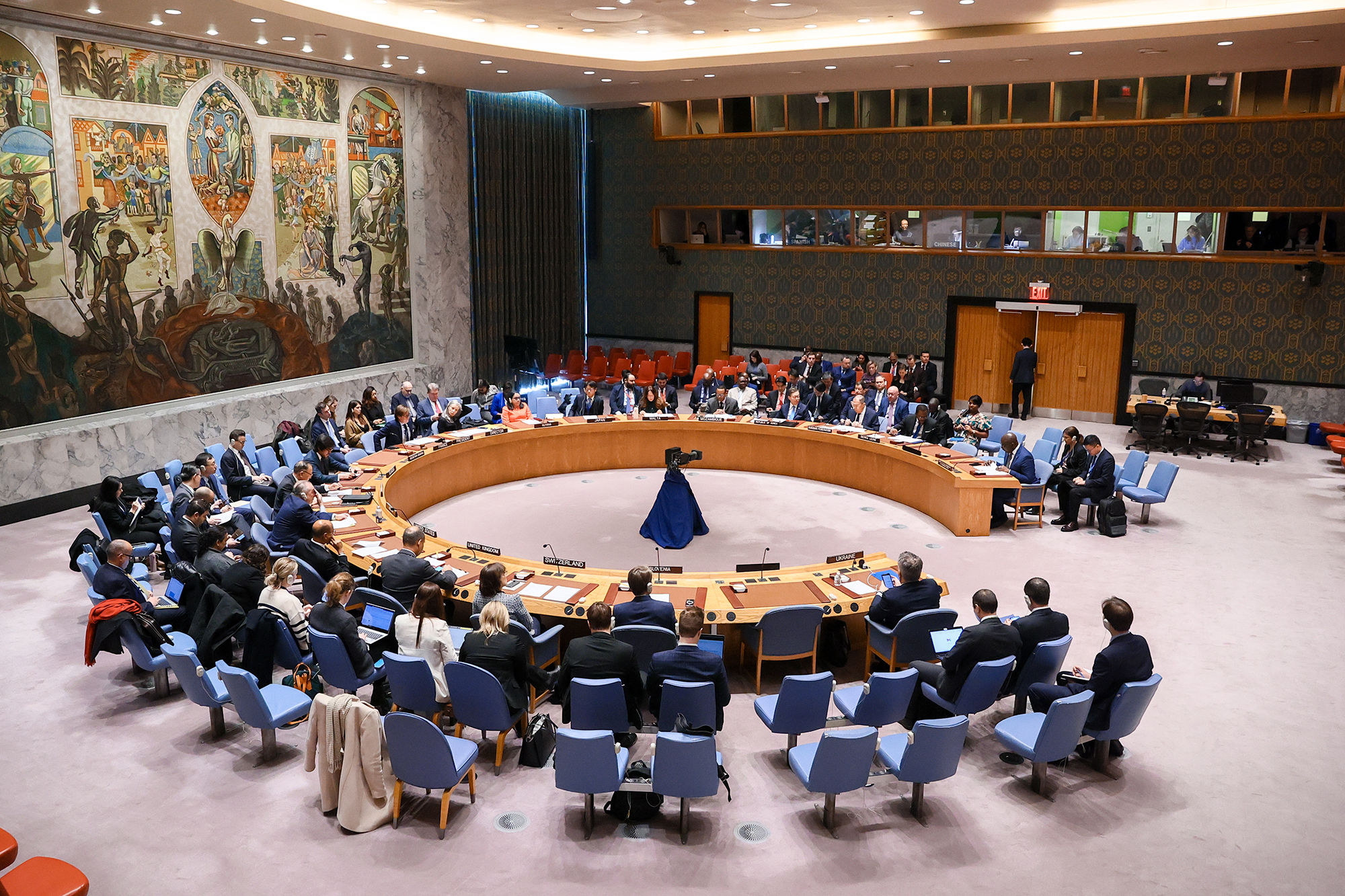 UN Security Council meeting (photo: Getty Images)
UN Security Council meeting (photo: Getty Images)
Not surprisingly, it is the General Assembly that has come to the fore, as it has done many times in history. But what do we see in the General Assembly? We also see that not all processes are in our favor. And I have my doubts that the situation for Ukraine will improve. Therefore, we will need to look for new approaches to acting in this regard.
Similarly, we will face many very practical issues in the context of peaceful regulation at the UN. We are talking about tools to ensure a future peace agreement. I would like to believe that one of the elements of peacekeeping guarantees will be deterrence forces involving European states and the United States.
However, such a scenario seems unlikely. Therefore, it will be necessary to work in parallel on some form of peacekeeping contingent on a corresponding mandate from the UN Security Council. This may be one of the important tasks that Ukrainian diplomacy will face in New York.
I also have a personal ambition to change the approaches to our representation in the UN Secretariat and numerous UN missions. I believe that Ukraine should work politically to ensure that Ukrainian diplomats occupy high positions in the UN system, including the Under-Secretary-General.
Never before have domestic diplomats held truly top political positions within the UN to influence processes that are important to Ukraine from within.
For example, the German Foreign Ministry has a whole department that searches for and prepares candidates for hundreds of vacancies at the UN, whom the German state actively lobbies for these positions.
I believe that it is time to make sure that there are not dozens but hundreds of Ukrainians in the UN system at all levels. From the highest level to the lowest.
We have dozens of worthy ambassadors, including those who are already retired, who could be recommended and promoted to high positions in international organizations.
This is my very practical view of the UN. I'm not going to fight with the Russians, I'm not even going to look in their direction. I'm not interested in debates with these theater people. Instead, we will be actively working both in the public sphere and behind the scenes to push for specific Ukrainian interests, and to make our voice at the UN louder and louder, so that no one can afford to ignore Kyiv's position.

